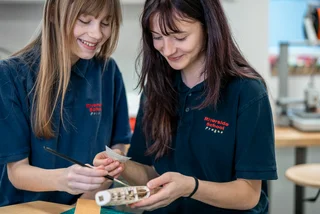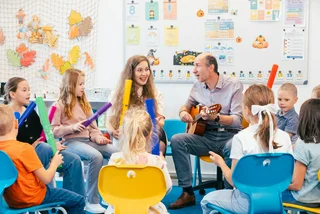Written by Robert Landau
Director, ISP
Few professionals get to have their children at the “office” every day of the week! As an educator and parent, I get to enjoy this pleasurable experience. Now I have no illusions that my two boys will become educators, but I hope that the schools they have attended will prepare them for the challenges and opportunities that the world has in store for them. Though I come from a national or state system, I have never worked in a public or state school. My oldest son did attend a local school in California for one year and I remained a critical observer and consumer. Returning to an international school, here in Prague, was like coming home again.
<?xml:namespace prefix = o />
PARTNER ARTICLE
There can be few in the developed world that are not aware at some level of the increasing interdependence which characterizes trade, business, and social activities today. The term most often used for this interdependence is globalization, defined broadly as “. . .widening, deepening and speeding up of world-wide interconnectedness in all aspects of contemporary social life.” With growing global mobility, the number of international schools worldwide has increased in an attempt to cater to the international needs of children who may return to their home country, or another location, for further education.
So what are the critical attributes of an international school? After all, there are so many choices and perceptions; not only in Prague, but also in any city you may be transferred to in the future. There are American schools, British schools, International schools — and then you can choose by language; French, German, Japanese, and more.
Curriculum
The foundation for any school, including international schools, is their curriculum approach. As described by Hayden et al., “. . . as the number and variety of schools have grown . . . it is clear that many are attempting to strike a balance between pragmatic and ideological dimensions in the experience they offer to students. It is against this backdrop that a number of different curricula have been developed which attempt to cater for students´ needs in a variety of different ways.” These curricula may be categorized under four main approaches:
exportation — national programs are offered abroad; adaptation — national programs are modified in order to be offered away from the home environment; integration — best practice from a number of different proven curricula is drawn on to create an appropriate curriculum to suit the mission and philosophy of the school; and creation— a new curriculum is developed from first principles.
The more progressive and prominent international schools, like ours, believe that the third category, integration, can accommodate the majority of our diverse population. After all, aren´t many of the world´s political systems shaped by a variety of converging philosophies? Don´t medical doctors use techniques taken from best practice and current techniques? Most professional practitioners draw from relevant and appropriate methods. Shouldn´t schools do the same? A school like ours is not bound by one country´s system. We are able to take from the UK, USA, Australia, Canada, and other systems to develop a significant program. A combination of national and international standards combined with contemporary teaching philosophies and methodologies ensure students the best of all worlds.
Programs and School Environment
What is important in an international school that is striving to cultivate world citizens and prepare them for further advanced education? I believe that the following elements are key to a successful international school:
Employ teachers from a number of different cultures; Offer examinations that are acceptable for university entrance in a number of countries; Use standardized tests that have been designed without cultural bias and piloted internationally; Develop links between the school and other locations outside the host country; Ensure a school environment where a number of languages are spoken; Teach tolerance and understanding of cultures whose practices are different; Sponsor projects in less developed countries; Students study subjects through more than one language; Instruction includes learning about other countries (history, geography, politics); Students learn about the local culture, and develop links with the host country; Classes undertake extended projects on topics related to a number of cultures; Students take part in activities related to the work of international organizations, such as debate, role-play, speech contests, and Model UN; Students are exposed to a number of cultures through films and TV programs; Students visit other countries as members of a school group or team and participate in exchange visits organized with schools in other countries; Students mix with a number of cultures within classes, activities, and clubs at school; Students participate in community service in the local community.
There may be additional indicators and everyone´s “top ten” may look different. However, as I wrote the list above, I was impressed and elated that the vast majority of examples are an inherent part of the International School of Prague! In fact, there are numerous schools like ISP around the world and this fact helps ensures a family like yours an effortless transfer from one school to another.
University Preparation
Studies show that approximately 90% of international school students go on to university. It is likely that these students will complete one of the following:
· English A level;
· American Advanced Placement (AP);
· French Baccalaureate (international option);
· Cambridge-developed Advanced International Certificate of Education (AICE); or
· International Baccalaureate diploma.
At ISP we offer both American Advanced Placement classes and the International Baccalaureate diploma.
Accreditation
Another important determining factor that exemplifies an international school is the Council of International Schools Accreditation Program (COIS). Of the over 600 international schools around the world, less than 175 are involved in the accreditation process. The key components include:
- an internationally-based evaluation for schools operating at elementary and/or middle and/or secondary levels;
- an evaluation instrument designed specifically for international schools;
- a sympathetic but rigorous evaluation of the highest professional standard.
The accreditation process has long been recognized in international school circles as a highly effective means of initiating and maintaining school improvement and demonstrating adherence to a set of publicly stated standards. ISP is fully accredited by the COIS (www.cois.org).
A Global Education
My children´s future does not resemble my past. The concepts, skills and attitudes they need go far beyond a content-driven education based on national standards. This school, like many others, has made a conscientious and concerted effort to develop and maintain an international school environment. Our global nomadic students will be better prepared to handle the challenges caused by globalization, technology, conflict, and environmental conditions. Possessing just knowledge will not be sufficient, in a world where the amount of information is escalating at a rapid pace. They will need to be problem solvers, decision-makers, and creative thinkers.
This all sounds wonderfully idealistic! In fact most international school are labeled as British or American simply by such criteria as curriculum (British National or American textbook), uniforms or informal dress, trophies in the display case, parent involvement or lack thereof. It is hoped that both parents and students ultimately look beyond these superficial attributes and understand the heart and soul of the institution.
The next time you attend a party or gathering, the topic of education will be discussed. You will be engaged in the strengths and weaknesses of one school or national system to another. Hopefully you can refer to this article and proudly say, “My child attends an international school, does yours?”
By Robert Landau, ISP Director
Visit: www.isp.cz for more information on Prague’s International School in Nebusice












 Reading time: 6 minutes
Reading time: 6 minutes 



















